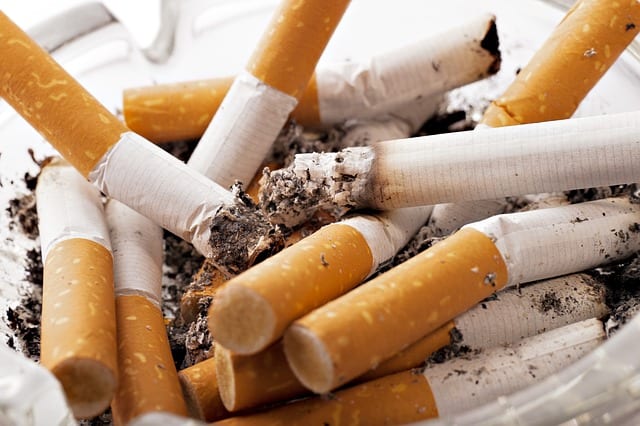
The first time I learned that our ecological choices can hurt people, I was in preschool.
Back in the eighties, when I was a preschooler, I used to go to the mall with my mother. It was a good place to go for a walk indoors when the weather was cold. She packed my little brother and me into the double stroller and wheeled us up and down the aisles, window shopping; sometimes, we’d get an order of fries in the food court for a treat. Sometimes, she’d let us out of the stroller to play by the fountain, which had pennies and dimes thrown into it, or by the planter, which was full of cigarette butts.
Maybe it was because I was so close to the ground at the time, but most of my memories of the eighties involve cigarette butts. People smoked indoors in the eighties. I used to see cigarette butts in toilets, in the cracks in the sidewalk, and especially at the mall. Careless litterbugs dropped them in the ornamental ficus planters at the mall, as often as they dropped them in ash trays. I used to wonder if cigarette butts were an ingredient that was put into mulch on purpose.
One day, because I was a preschooler and preschoolers have a death wish, I decided to play with the cigarette butts. I picked one up out of the planter and put it in my mouth, just like grown-ups did. I blew into it as if it were a kazoo instead of inhaling, because I didn’t understand that part of smoking. I thought it was just about making an interesting cloud come out of your mouth.
My mother noticed me and screamed.
The past couple of days, there’s been a lot of squabbling in the Patheos Catholic comment boxes about the Pope’s announcement that he’d like to add a list of “ecological sins” to the catechism. People are calling it idolatry or “ecoloatry,” as well as political correctness and Jesuit nonsense. They want to get back to the teachings of the Gospel instead of acting like what we do to the environment could be a sin. I tried to clarify how someone could be said to “sin against ecology” over the weekend, but it didn’t seem to help.
The next thing I knew, someone had committed the ultimate Catholic non sequitor: they brought up abortion in a conversation that was about something else. If you don’t run in Catholic circles very often, trust me: this happens so frequently it’s become a cliche. This person remarked: “Somehow I highly doubt if I confessed to throwing a gum wrapper out of my car window, the priest would think it’s comparable to the sin of abortion.. even if it was a Jesuit priest who heard my confession.”
People were liking that comment and applauding her. They thought she’d got off a really good one. Other people made variations on the same remark.
I never thought I’d have to say this, but for the record: no one is saying that littering is equal in gravity to abortion. Nobody at all. We are not comparing the two issues, or at least we weren’t until it was brought up and now we have to. Killing people is worse than littering.
But that doesn’t mean that littering isn’t a sin.
What is a sin? A sin is “an utterance, a deed, or a desire contrary to the eternal law,” and it is an offense against God.
What does God want us to do? What is his law? He wants us to love Him with all our heart, soul, strength and mind, and to love our neighbor as ourselves. All the other commandments just teach us how to do that. When we do something on purpose which is against those commandments, we sin by commission, and when we omit to do something we were supposed to do that would fulfill that commandment, we sin by omission. That’s what a sin is.
If we do or omit something that is especially serious and damaging– for example, if we murder someone or deliberately neglect them until they die– that’s grave matter. When we commit grave matter on purpose, without being coerced by any force beyond our control and with full knowledge of what we’re doing, we sin mortally. Any other sin is a venial sin– still a terrible thing. Technically speaking we can never know if anyone has met every one of the three conditions necessary to commit a mortal sin, so we can’t judge anyone’s action as mortal or venial, but we can definitely identify what’s grave matter and what isn’t.
The number of sins, mortal or venial, which we ought to commit, is zero, but nobody except Jesus and Our Lady ever managed to do that. The number of sins we ought to repent of, is all of them. Not caring whether or not you’ve committed a venial sin is the sin of lukewarmness, which is grave matter. This doesn’t mean we should be scrupulous and go around nitpicking and hating ourselves all the time. It means we should be constantly praying with humility and trust that God reveal to us how we can love Him better and what bad habits of ours we need to overcome. When we see ourselves doing something we shouldn’t, we should repent of that, trust in God’s mercy, make amends as is possible and prudent, and do better next time. If we believe we’ve sinned mortally, we should tell God we’re sorry immediately and go to confession as soon as we can.
Most everyone who was catechized in the Catholic church knows all of this, but I think we need a refresher course if we’re going to talk about whether something is a sin or not.
Now, this brings me back to the question of a “sin against ecology” or an ecological sin. Is littering a sin? Well, it’s inconsiderate and sloppy of you. If you do something inconsiderate and sloppy because you honestly just didn’t think, I don’t think that rises to the level of a sin– unless you’ve developed a habit of callously not thinking about the good of others, which is a bit of a different matter. But if you’re thinking about what you’re doing, you know that littering will make the world dirty and ugly for your neighbor and create extra work for the custodian. You might remember that cigarettes are a fire hazard. You might even consider that some wayward preschooler will put the litter in her mouth and that might give her mom a heart attack. And if you still throw your cigarette in the ficus planter instead of disposing of it properly– you did something that you know would hurt your neighbor because you were too lazy to do something else. That’s a sin. It’s not grave matter, it’s venial, but you should still repent and try to do better.
That’s how this whole idea of “ecological sin” works. It’s nothing new. It’s just applying the commandment to love our neighbor as ourselves to what we know about ecology and about being courteous to others. Don’t hurt people, including by messing up the environment they live in. They need the environment to live, work and play in. You could hurt them if you mess it up. Hurting your neighbor on purpose or doing something that can hurt them without caring that you hurt them, is sin.
The second question is, could an ecological sin ever be as bad as killing somebody?
Well, potentially, it might be. Because very serious ecological sins CAN kill people.
According to Catholic teaching, abortion is a grave sin because it kills a person. Killing people is grave sin. If you give free consent to do such a thing with full knowledge of how wrong it is, that’s a mortal sin. And remember that you can sin by omission as well– failing on purpose to do something you ought to do even though you know that that failure stands a great chance of killing somebody, is killing that person, and killing is grave sin.
If, for example, members of a municipal government decided to save some money by voting not to properly treat the polluted water supply and not to replace the aging pipes, even though they knew full well that that action could hurt or kill the people who drank the water– that is an ecological sin. It’s messing up somebody’s environment in a way that hurts them, because they were too greedy for money to care whether or not they did. And when you consider that pregnant women in areas where the water supply is contaminated like that have a much greater likelihood of miscarriage than women whose water supply is safe, I’d suggest that you can go ahead and call that sin as bad as abortion. It causes unborn babies to die, after all.
If, just theoretically speaking, you’re a CEO of a gigantic conglomerate of billion-dollar corporations, and if you’ve read the scientific research on climate change and you believe that man-made climate change stands the chance of killing hundreds of millions of human beings and causing suffering for everyone on earth– I’m not going to tell you what you have to believe right now, I’m just saying IF you believe that– and IF you have the means to mitigate that risk by phasing all of your factories off of fossil fuels and replacing the plastic in your products with bioplastic, but you choose not to because you’d rather spend your money on building a space ship for fun… I would definitely say that’s a grave sin as well. And if any of my readers happens to be a CEO of a gigantic conglomerate of billion-dollar corporations, I would just like to say, hello! I hope you like the blog. I live on tips, my online tip jar can be found here, and I pray for the intentions of all of my patrons. Please repent of your sins and believe in the Gospel. Climate change is real. Bioplastics, my boy, bioplastics.
I don’t think most of my readers have ever committed a mortal ecological sin. Ask you confessor if you have any doubt.
But I think every one of us commits venial sins at a high rate every day, and I think we need to be constantly repenting when we find we’ve done wrong. I am going to keep an eye on how my relationship with the environment hurts my neighbor, and I’m going to try to do better even though I can’t do very much. That’s what I hope everyone takes away from this silly discussion. We can all do so much better, and we ought.
And stop smoking at the mall. It’s a filthy habit.
(image via Pixabay)
Steel Magnificat operates almost entirely on tips. To tip the author, visit our donate page.













